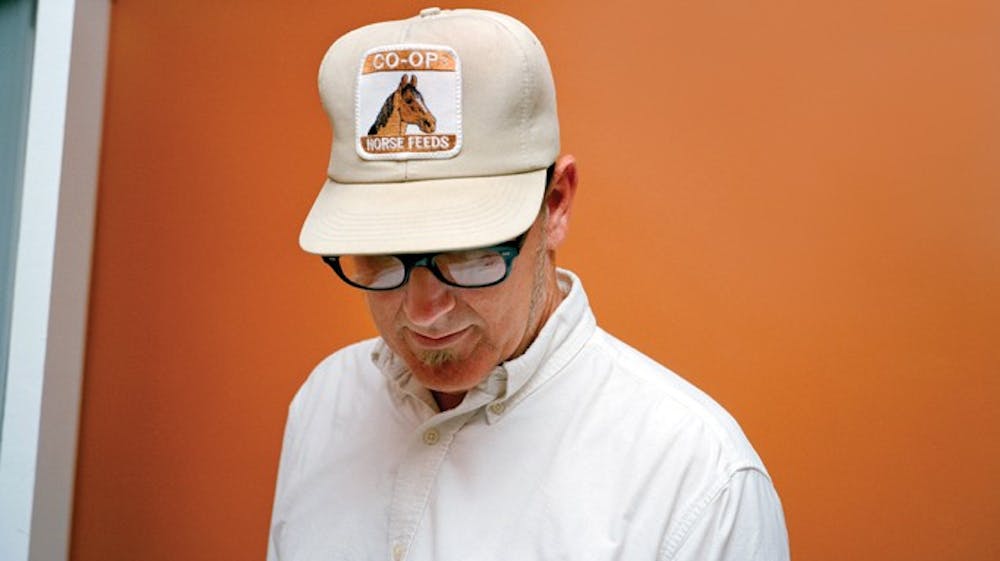Alejandro Escovedo says that the last time he played a bill with Lambchop, the two bands covered a Buzzcocks track together. It’s not an expected choice for either Escovedo or Lambchop’s Kurt Wagner, but it’s not surprising either.
It’s this paradox between predictable and surprising that defines these two musicians, much as it does the pairing for their Friday Duke Performances show.
Musical titans, Escovedo and Lambchop (the band’s numbers are ever in flux, but its core is Kurt Wagner) represent different musical upbringings and even more different sounds. Genre-defying in their own ways, there is a conceptual tie that, however abstractly, makes perfect sense.
Both musicians come from a specific place, and their sounds respond to that location. But the sound is not necessarily what anyone has come to expect from that region. Take Wagner, who, along with his bandmates, hails from Nashville, Tenn., the careerist capitol of country music.
Wagner says that during Lambchop’s foundational years in the late ’80s and early ’90s, the band was taking some cues from the Nashville soundscape but bringing its own ideas, too. This approach is apparent on any Lambchop record, 1994’s I Hope You’re Sitting Down especially.
“We took that idea that [what we’re doing] is basically the same thing that they’re doing, it just sounded different,” Wagner says. “That may sound strange, but at the time and conceptually, it all seemed to fit into place.”
Escovedo, like Wagner, was raised in the place he still calls home: San Antonio, Tex. He was reared in a noisy household on a healthy diet of everything: Latin jazz, swing, rock ‘n’ roll and ranchera, to name a few, all of it figuring into his songs.
“Just very early on, I got a sense that it wasn’t about genres, it was about the quality of the music,” Escovedo says. “What was moving and what wasn’t, what was swinging and wasn’t and what was rock and what wasn’t.”
What complicates—or, rather, enriches—Escovedo’s musical sensibilities is his punk background. Playing with first-wave act the Nuns and later True Believers, the musician says that the punk mindset has continued to inform his musical sensibility.
“It’s always with me,” Escovedo says of punk. “Not just philosophically—creatively it’s always what drives me. It’s always what make me want to push myself a little more each time I make a record, each time I write a song.”
Director of Duke Performances Aaron Greenwald says it’s this nebulous relationship to genre that drew him to pair Escovedo and Wagner—whom he calls “commanding” front men.
“I thought that relationship to genre was something that made them contemporary,” he says. “That seemed to me to be a hallmark of something contemporary, that it was related to genre and that it existed outside of genre.”
Greenwald adds that this notion of understanding what it means to come from a place and engaging that in a way that is not old timey is central to what this season is exploring.
Factoring in these backgrounds, it becomes even more difficult to describe what either sounds like. Both could be lumped into any number of genres, none perfectly fitting. And perhaps this is what makes them vanguards of contemporary music.
In drastically different ways, Escovedo and Wagner are challenging the musical establishment, pushing boundaries and even questioning their own notions of what music can be.
“Rock ‘n’ roll has a cyclical sense to it,” Escovedo says. “When I listen to the radio and try to keep up with what’s happening… and maybe I’m just looking in the wrong places, I don’t hear anything that defines any new sound and approach to the music.”
And maybe what Escovedo is doing isn’t new. Perhaps the same goes for Wagner, even when he’s adding lush orchestral backdrops to Lambchop’s live show. If this is the case, then it must be said that what both artists are doing is certainly inspired.
And after years of plugging away—Escovedo released his first solo album in 1992, Lambchop’s first studio album arrived in 1994—it’s even more remarkable that they’ve endured in an age when bands with original sounds can come and go in the blink of an eye.
For Wagner, his answer to why Lambchop has survived evinces his modesty about the project.
“We’re not the most ambitious group on the planet,” he says, laughing. “Our ambitions lie in just trying to make better music. It seems like we’ve steadily progressed in our own way without trying to overextend ourselves by virtue of ambition or whatever.”
Wagner adds that this very modesty—resisting the hyperbolic nature of music journalism that pushes acts into a quick ascent and even quicker fall, he says—keeps the band grounded and allows them to continue.
But what’s clear about Lambchop and Escovedo is that in their impressive decades of music-making, they’ve maintained a remarkable level of quality, whether the masses have taken notice or not. They might have a lot in common, or they might not. But they’re both darn good. And that should be enough.
Lambchop and Alejandro Escovedo play in Reynolds Industries Theater tomorrow night at 8 p.m.
Get The Chronicle straight to your inbox
Signup for our weekly newsletter. Cancel at any time.

